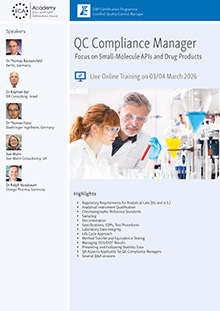EMA publishes Document on the Validation of analytical Methods
On 26 June 2014, the European Medicines Agency (EMA) published the concept paper "Transferring quality control methods validated in collaborative trials to a product/laboratory specific context".
To accept a method an authority always requires a scientific validation. The same applies when existing methods are to be replaced, reduced or to be optimized (3R = replacement, reduction, refinement). Many of these new methods principally represent an improvement compared to the old "standard" methods and therefore are acceptable from a regulatory perspective.
The scientific proof of validation also includes the evidence of the concept and the possibility to transfer a method between different laboratories as well as large scale collaborative studies indicating that a method is suitable for the intended purpose. After completing these steps successfully, it can ultimately result in a monograph of the European Pharmacopoeia (Ph. Eur.) or also in a guidance document for the WHO or the EMA.
This method's validity has to be proven by the laboratory that proposes the new method. Moreover, this validation also needs to be proven specifically for the medicinal products it is supposed to be used for. Laboratories that participated in large scale collaborative studies before, usually already created plenty of data telling something about the function of this method.
This EMA concept paper now suggests that more guidance documents should be developed on this subject: how can these data from large scale collaborative studies be used to easier implement the laboratory- and product-specific validation of 3R methods (3R - see above)? The concrete specifications for this are currently still missing.
The issue is also to introduce an alternative method without necessarily having to show that the new method correlates with the existing Pharmacopoeia method.
To get additional details please see the complete Reflection Paper "Transferring quality control methods validated in collaborative trials to a product/laboratory specific context".
The deadline for submission of comments is on 31 October 2014.
Related GMP News
GMP Conferences by Topics
- General Quality Assurance and GMP Compliance Topics
- Hygiene
- General Microbiology Topics
- Regulatory Affairs
- Development
- General Analytics Topics
- Good Distribution Practice
- Sterile Manufacturing
- Computer Validation
- General Qualification/Validation Topics
- General Engineering Topics
- APIs/Excipients
- GMP Basic Training Courses
- Medical Devices and Combination Products
- Packaging and Packaging Material
- Data Integrity
- Qualified Person (QP)
- GMP Auditing
- Documentation
- Cleaning Validation
- General IT Compliance Topics
- Impurities
- OOS / OOE / OOT
- Material Testing
- Validation of Analytical Methods
- Analytical Instrument Qualification
- Stability Testing
- Microbiological Testing
- Technology
- General Manufacturing Topics
- Solid Dosage Forms/Semi-Solid Dosage Forms
- Biotechnology/Blood/ATMP
- Herbal Drug Products/Cannabis/Radiopharmaceuticals
- Others





